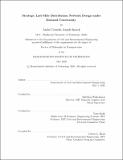Strategic last-mile distribution network design under demand uncertainty
Author(s)
Snoeck, André Cornelis Joseph.
Download1192461946-MIT.pdf (2.987Mb)
Other Contributors
Massachusetts Institute of Technology. Department of Civil and Environmental Engineering.
Advisor
Matthias Winkenbach.
Terms of use
Metadata
Show full item recordAbstract
We propose quantitative models to incorporate demand uncertainty and physical distribution flexibility into the strategic design of last-mile distribution networks. Last-mile distribution typically constitutes the most expensive part of any global supply chain, and it is becoming increasingly complex due to the ongoing boom in e-commerce, the associated rise in customer expectations, and the increasing levels of urbanization. Appropriately designing the underlying distribution networks, including facility location, inventory allocation, and eet composition decisions, is paramount for the ecient operation of both traditional and highly responsive last-mile distribution services. In traditional networks, the order collection and delivery periods are segregated by an order cut-o, rendering the operational distribution problem deterministic. We propose a stochastic programming model to capture the temporal hierarchy of decision making between strategic decisions made under uncertainty and deterministic operational recourse actions. However, for highly responsive networks, the order collection and delivery periods are intertwined, rendering the operational planning problem dynamic and stochastic. The aggregations and approximations required to formulate a tractable stochastic programming model fail to accurately capture the constraining impact of the strategic design on the operational response to dynamically realizing demand. Therefore, we propose a metamodel simulation-based optimization approach to address the design problem for highly responsive last-mile services. In this approach, we integrate a high-level analytical metamodel with an in-depth, disaggregate simulator. We show that including demand uncertainty in the design process leads to networks that incorporate redundancy and flexibility in the strategic design, resulting in increased cost performance. Based on a study with a fast-moving consumer goods company that operates traditional distribution networks in emerging economies, we show that a stochastic design approach outperforms deterministic approaches, with and without embedding physical distribution flexibility in the network. In addition, we conduct a study with a global fashion company that aims to deploy a one-hour delivery service in Manhattan, NY. We show how congestion in order processing at facilities leads to picking queues that harm performance by an increase in late-delivery and a reduction in consolidation opportunities. Furthermore, we show that incorporating uncertainty allows to accurately incorporate local stock-out inventory effects. Based on a generalization of the newsvendor model, we analytically show the potential for cost reduction that emerges from leveraging existing brick-and-mortar assets, including inventory positions and retail stores, in highly responsive distribution networks.
Description
Thesis: Ph. D. in Transportation, Massachusetts Institute of Technology, Department of Civil and Environmental Engineering, May, 2020 Cataloged from the official PDF of thesis. Includes bibliographical references (pages 167-173).
Date issued
2020Department
Massachusetts Institute of Technology. Department of Civil and Environmental EngineeringPublisher
Massachusetts Institute of Technology
Keywords
Civil and Environmental Engineering.